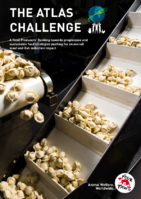
Food producers
What are the leading food producers progressive food strategies?
It is no secret that consumers are demanding greater transparency about the environmental, health and animal welfare implications of the food they buy, requiring companies to step up their sustainability efforts. FOUR PAWS conducted a ranking on the leading producers of convenience foods* by companies depicting the forward-thinking companies to the ones falling behind, in relation to a sustainable economy.
The below ranking shows the targeted food producers of convenience foods and how they compared to each other. FRoSTA not only scored the highest but is the first champion in the sector to sign the commitment towards meat and fish reduction! Will the rest follow suit?
*Convenience foods: or tertiary processed food, is food that is commercially prepared to optimise ease of consumption. Such food is usually ready to eat without further preparation. It may also be easily portable, have a long shelf life, or offer a combination of such convenient traits.
* DE, AT + CH Abbreviation for Germany (DE), Austria (AT) + Switzerland (CH)
** UK = United Kingdom
The Atlas Challenge ranking is based on FOUR PAWS’ assessment. It provides a clear understanding of the food producers performance, when it comes to progressive food strategies which support a meat and fish reduction approach as well as of meat substitutes and innovative (plant-based) alternatives. The reduction of meat and fish products and the availability of alternatives from plants is the key to lower greenhouse gas emissions and the impact on our planet and farm animals suffering in factory farms.
For more information click here.
did you know?
- Beef production is the world’s biggest driver of tropical deforestation.1
- By making one meal a week with lentils instead of beef, a family of four can save the equivalent of 17 bathtubs full of water.2
- Most of the fish we eat will be farm-raised by 2030 which poses huge risk to the environment.3
- To create just a 113 grams burger patty, 3 kg of grain is used.4
- The global plant-based meat market is currently valued at €10.2 billion and is predicted to grow at a CAGR of 15% over the next six years, reaching almost €23.6 billion by 2025.5
- Plant-based proteins have all the protein of meat with less fat and no cholesterol.6
- Every 1.8 kg of beef you eat contributes to as much global warming as flying from New York to London.7
- Industry analysts estimate plant-based meat substitutes might grab 50% of the meat industry by 2050.8
- Plant-based milk is the most developed of all plant-based categories. The least is plant-based eggs which is now the fastest growing.9
- Fish replacement is expected be the next big wave in alternative protein development.10





















